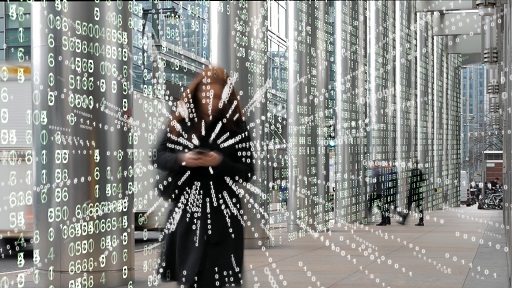6.1 Surveillance
In Nineteen Eighty-Four, Winston Smith is constantly aware that Big Brother is watching him. A key theme of the novel is the extent to which the state (or The Party) keeps the population under control by using surveillance to suppress dissident ideas or internal criticism of the party. This is, of course, routine in non-democratic states. For example, you can see parallels in contemporary China which is a one-party state in which the Chinese Communist Party allows its citizens ‘freedom’ as consumers, but otherwise exerts total political control over their lives. However, even in a democratic country such as the UK, the government also holds an enormous amount of data on its population. In Activity 4, you will explore contemporary examples of the novel’s continuing significance by considering this in more detail.

Activity 4
In the box below, note down what information the UK government (or government of any other democratic country) holds about its population and how information can be traced.
Discussion
Your date and place of birth; details of income for tax purposes; your medical records, driving records, and any criminal convictions you may have are just a few of the details that are held on central databases. You can be traced through the numbers on your driving licence or the number plates on your car. You can be traced through the numbers on your passport, your National Insurance cards, or your NHS medical cards.
All British passports issued in the last ten years include a microchip which holds biometric information that allows a machine at passport control to scan the passport and match data on it to enable facial recognition. More recently, the COVID-19 epidemic has raised the possibilities of people in the UK being issued with passports to prove their vaccination status.
Finally, if you are out and about, then your movements are often captured by CCTV.
Do you think that the amount of personal data held by the government is necessary for the effective governance of a modern society such as the UK? Or do you think there is cause for concern? Note down your thoughts in the box below.
Discussion
In the UK, there are data protection laws. Many people would argue that the sort of personal data held by democratic states is necessary for effective law enforcement, the maintenance of public health and, more generally, to manage the complexities of modern society. Others, however, may express reservations that the huge amount of information held by the state poses a threat to individual freedom and the right to privacy.
However, even if people are relatively happy about the government holding so much of their personal information, they may not necessarily feel the same about the extent to which many the world’s biggest private companies (such as Amazon, Apple, Facebook and Google) hold such vast amounts of personal data – whether encrypted or not. Neither can it be assumed that big companies hold data securely. For example, in 2018, after a ‘whistle blower’ raised the alarm, the data analytics firm Cambridge Analytica (where the former Trump aide, Steve Bannon was a board member) was shown to have used personal data harvested (improperly) from Facebook in 2015 to target millions of US voters during the 2016 US presidential election (Cadwalladr, 2018).
Over the course of a typical week, how often do you provide third parties with your personal details or give out other personal information? Make a note in the box below.
Discussion
Whenever you make online purchases, you are supplying a third party with your name, address, email address, phone number and bank details. If you have joined Facebook or another social media platform, you may post photographs, or details about where you have been and who you were with. It is reasonable to assume that Orwell be astonished at how easily many of us voluntarily surrender our personal data on a daily basis. And even if you think you are careful about protecting your personal information, you do not know the true extent to which big communications companies are handing over private data to the state or to other parties. In 2013, this was one of the issues Ed Snowden (the NSA ‘whistle blower’) drew attention to.
In Nineteen Eighty-Four, people’s lives are monitored by a ‘telescreen’. Many people have drawn an analogy between Orwell’s depiction of the telescreen and how smart phones are used in contemporary society. Of course, the comparison is not exact. Winston Smith was unable turn his telescreen off. We can, of course, switch our phones off. However, many of us rarely do so, because we have become so used to the instant communications that phones offer (whatever time of day or night). Many of us use our phones for instant messaging, to search for information online, for entertainment, to take and store photographs and so on. If your phone is switched on, it is also possible for you to track the movements of others – and for others to track your movements. Every time you use your phone, you are also (whether you choose to or not) providing data (of one sort or another) to a third party. Smart phones, then, have become ubiquitous in modern Britain. If you have used public transport in the last few years, you will probably have noticed that many of your fellow passengers spent at least part of the journey looking at their phones.
